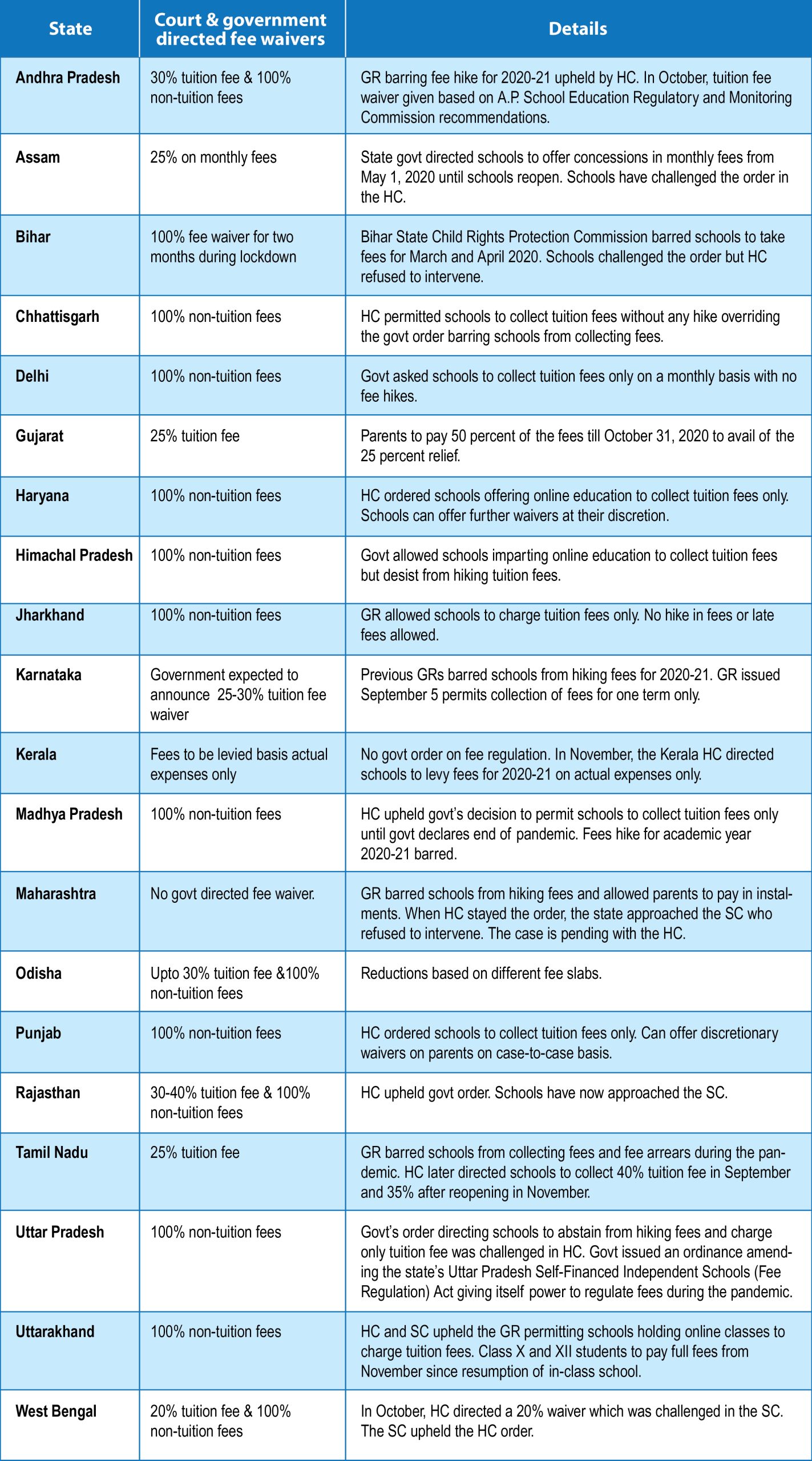New state government fees diktats add to private schools woes
-Bandana Brahmin and Dipta Joshi
Despite the grim financial plight of 450,000 private unaided especially budget private schools in the country due to non-payment of fees by parents during the past nine months of schools closure, several state governments have added to their woes by issuing a spate of new, arbitrarily drafted and contradictory orders on fee waivers/reductions.

Over the past few weeks, the Odisha government has issued a circular advising schools to reduce tuition fees based on different fee slabs while the Karnataka government is expected to soon announce a 30 percent reduction in annual school fees for the current academic year. With schools having reopened only recently in these states after nine months of closure, such fee waiver announcements are unwarranted and leading to more confusion at a time when the focus of school managements should be on making up for the learning loss of students and mobilising resources for implementation of their post-pandemic recovery roadmap. Moreover several private school managements have been voluntarily doling out tuition fee discounts and reductions over the past ten months while continuing to invest in training and technology for providing uninterrupted online learning to students.
In this connection, it is important to note that a nationwide survey conducted last year by the Delhi-based National Independent Schools Alliance (NISA) — which represents 60,000 budget private schools (BPS) across the country — indicates that the fees of a mere 38 percent of school students countrywide were paid during the national lockdown period of April-June. Schools struggled to collect the contractual fees from parents despite the fact that 70 percent of the country’s 450,000 private schools levy tuition fees less than Rs.1,000 per month according to the Private Schools of India Report 2020 of the Delhi-based Central Square Foundation.
“While loss of jobs and stable family income due to the pandemic has rendered many parents incapable of meeting their children’s education expenses, a large majority of defaulting parents are well able to afford the school fees. In view of the economic impact of the Covid-19 pandemic, private schools in Karnataka have not implemented the annual 10-15 percent fee hike for the current academic year and having witnessed a mere 5-10 percent new admissions for the upcoming academic year, their cash flows are completely depleted. Moreover, most of our member schools have voluntarily offered fee discounts upto 30 percent for the current and upcoming academic year but parents are still failing to pay up and many are admitting their wards in government schools without following a proper transfer protocol,” says D Shashi Kumar, general secretary, Associated Managements of Primary and Secondary Schools in Karnataka (KAMS), which has a membership of 4000 state board affiliated private unaided schools.
In view of the mounting fee arrears and continuous flight of students to government schools, KAMS has recently issued an advisory to its member schools to reduce fees by 20-25 percent where the annual fee structure is more than Rs. 25,000 per annum and also suggested them to offer parents more time and flexibility to pay the fees in installments.
“As per media reports, the government is mulling an across-the-board fee waiver order for private unaided schools in the state to the tune of 30-40 percent without realising the impact such an arbitrarily fixed cut will have on teachers’ salaries. However, the state education department has not considered reduction in any kind of fees for students. Infact, the SSLC exam fee has been hiked for the current academic year. If at all the government issues an across-the-board fee waiver order, it has to be within the framework of the Education Secretariat notification ED PGC 2019 which is what we have advised our member schools too,” adds Shashi Kumar.
In neighbouring Maharashtra, the government directed schools to abstain from hiking fees and allow parents to pay in instalments through a government resolution (GR)/ dated May 8, 2020. School associations have challenged the order in the Bombay High Court which stayed the order. The state government then approached the Supreme Court who refused to intervene. The case is now set for hearing in the high court on January 27. However, despite the GR being stayed, schools in Maharashtra have continued to charge fees as per the 2019-20 fee structure for the current academic year instead of implementing a 10 percent annual hike. Some schools have also waived fees after verifying parents’ financial documents.
“While schools in Maharashtra have not really reduced fees, they have done so indirectly by continuing to charge fees as per the 2019-20 fee structure for the year 2020-21 too. Typically, 95 percent of schools generally hike fees by 10 percent each year but since the lockdown schools have not hiked fees. Some schools have also given scholarships to their students,” says Subhash Chandra Kedia, honorary secretary, Unaided Schools Forum (USF) of Maharashtra.
Rohan Bhat, chairman, Children’s Academy Group of Schools, says, “Unfortunately, since the closure of regular schools due to the pandemic, the image circulated is that school managements are only interested in profiteering. The truth is many schools have offered discounts and loans too even in the absence of any government mandated fee waivers (like in the case of Maharashtra). Parents and school managements need to work in synchronisation and not cross-purposes since both need each other.”
Children’s Academy not only paid full salaries to all its staff throughout the lockdown but also continued providing online education to all students irrespective of delayed fee payments or defaults. Students are also being sent study kits containing printed notes, worksheets and science kits for their ‘Think Lab’ activities. Online assessments/learning programmes such as ‘Open Door’ and ‘First in Math’ and life skills programme ‘Lessons in the Dark’ are also being provided continuously to students.
In West Bengal, the Calcutta High Court in its order dated October 13, had directed schools to waive 20 percent tuition fees from April 2020 till a month after the schools resumed physical classes. However, even before the HC order, almost all church-run schools including those run by the Church of North India, Roman Catholic churches and Methodist churches had been offering fee discounts ranging between 25-100 percent to students whose parents’ income had been affected by the pandemic. The schools run by Anglo-Indian organisations have also followed suit. The non-Christian missionary private schools in the state are also offering fee discounts in addition to the mandatory 20 percent waiver fixed by the High Court. The managements of all these schools decided on the extent of the fee discount after examining the financial circumstances of individual applicants.
With private schools facing the humongous challenge of making up for the learning loss suffered by children, the government needs to back off from unnecessary regulation of fees and allow school managements and parents to resolve fees-related issues bilaterally.
















Add comment